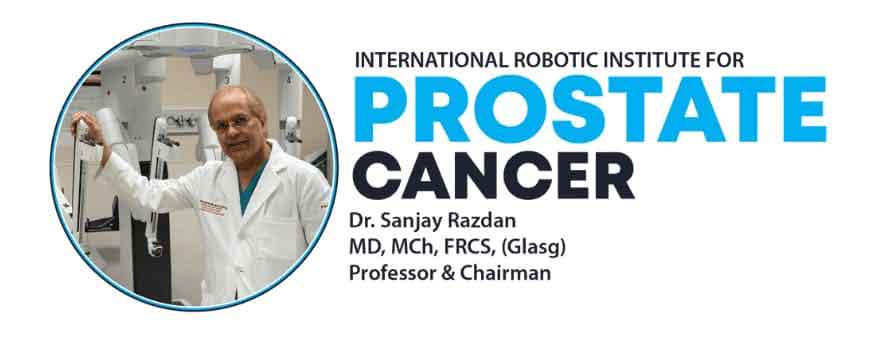About Prostate Cancer
Answers to common questions about prostate cancer and prostate cancer surgery
Fighting Prostate Cancer. The Second Leading Cause of Death in Men
According to the American Cancer Society, more than 191,930 men were diagnosed with prostate cancer in the United States in 2020, and more than 33,330 men died of the disease. With these startling statistics, it is important for men and their families to be aware of the disease, understand who is most at risk, and what they can do today to lower their chances of battling this disease.
What is prostate cancer?
Prostate cancer refers to abnormal cells in the prostate gland, which is part of the male reproductive system. The prostate is situated just below the bladder and in front of the rectum. A normal prostate is about the size of a walnut.
Who is at risk for prostate cancer?
This prostate disease can affect men of any age, but it is most common in men over the age of 50. Eight out of 10 men who suffer from prostate cancer are over the age of 65. African-American men are at higher risk, as well as men with a family history of the disease. Men who are obese or eat a high-fat diet may have increased chances of getting prostate cancer. The strongest association is genetic. If your father, uncle, or brother had prostate cancer, you have a much higher risk of developing the disease and should probably start screening at age 40 or even earlier.
What can be done to lower the risk of getting the disease?
While researchers continue to study the effect of diet and other lifestyle factors on a man’s risk of developing prostate cancer, some changes may be associated with a decreased risk of prostate cancer. Men are encouraged to eat a diet low in fat, especially animal fat, and include more fruits and vegetables. According to the National Cancer Institute, studies show that a diet high in dairy products and calcium may also be linked to an increased risk, although the increase may be small.
What are the symptoms of prostate cancer?
In most cases, early-stage prostate cancer does not produce any symptoms, but they may begin to appear as the tumor grows. Symptoms include:
- Difficulty starting to urinate
- Less force on the stream of urine
- Frequent urination, especially during the night
- Pain while urinating
- Blood or pus in the urine
- Pain in the hip, lower back, or lower part of the pelvis
- Unintended weight loss and/or loss of appetite
What types of options are available to treat prostate cancer?
Prostate cancer can be treated successfully if it is caught early, before it spreads to other parts of the body. Surgery, Radiation therapy, , and Hormonal treatment are all reasonable options in the appropriate clinical setting. One new treatment option for patients is the development of a revolutionary new form of prostate surgery, the nerve-sparing robotic prostatectomy which allows the surgeon to perform minimally invasive procedures, such as removal of the prostate, in hard-to-reach areas with more precision while preserving sexual function. Because this technology is less invasive than other surgical options, patients experience minimal pain, minimal blood loss, and a faster recovery. Patients undergoing this procedure can expect an excellent chance of cure with a return to normal activities within days.
Dr. Razdan, who has now performed over 10,000 Robotic procedures, has developed surgical techniques that allow maximum preservation of critical nerve structures to ensure patients have zero continence issues and healthy erections after surgery. Dr. Razdan has been featured in various clinical publications in journals discussing the incredible outcomes, including A novel intraoperative physician-assigned grading score to predict postoperative return of potency at 1 year after robotic-assisted laparoscopic prostatectomy.
At the International Robotic Institute for Prostate Cancer, world-renowned surgeon Dr. Razdan and his highly experienced and skilled team of assistants are now even offering outpatient robotic surgery for prostate cancer with human amniotic membrane. Fortunately, in the majority of cases, patients are not troubled with incontinence or impotence. Dr. Razdan recently developed his technique of “Athermal combined antegrade and retrograde nerve preservation,” which has resulted in vastly superior outcomes concerning erectile function. After surgery, our Penile Rehabilitation Program is uniquely suited to working individually with each patient in a compassionate manner to ensure the excellent results for which this center has become recognized for.
How can men learn more about prostate cancer and the various treatment options?
The International Robotic Institute for Prostate Cancer has state-of-the-art diagnostic testing equipment, such as the MRI Guided Prostate Fusion Biopsy and the latest minimally invasive treatment options for the prostate and other urologic problems. The Center is staffed by internationally recognized physicians who are experts in these types of urological diseases. Dr. Razdan’s Cancer Support Line, which has hundreds of patients enrolled, is another valuable resource for patients seeking insight into prostate cancer treatment and what to expect before, during, and after surgery.
Finally, Dr. Razdan has amassed thousands of video testimonials, more than any other Urologist in the world, on his exceptional outcomes. Patients from all over the United States have travelled to Dr. Razdan for Robotic Prostate Cancer Surgery. They provide detailed video testimonials in English and Spanish on the experience, why they chose the International Robotic Institute for Prostate Cancer over other locations, and the results after surgery. Patients include celebrities, government figures, business executives, other doctors, law enforcement, and men from all walks of life.
For more information or to schedule an appointment, call the International Robotic Institute for Prostate Cancer at 305-251-8650






 WhatsApp
WhatsApp

